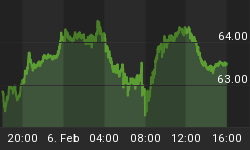Many have mistakenly dismissed silver as just another commodity like oil, for example. If one looks at how silver has traded since 2001, in comparison with oil, one might agree with that mistaken believe. Below is a comparison of silver and oil since 2001 (charts from stockcharts.com):
During the same periods, both goods traded higher or lower, together. For example, from 2001 to 2008, both silver and oil rose significantly. During those seven years, silver increased more than four times in value while oil rose more than seven times.

Based on the above chart-comparison, some might even argue that it is silver that is more overvalued than oil since it is trading at greater than triple its 2001 value, whereas oil is only trading at double its 2001 value.
Yes, they might have traded similarly since 2001, as well as during some other periods; however, they are at completely different points in their respective cycles. Oil is a true commodity, and it is ultimately subject to forces that rule over commodities, whereas silver is real money and likewise, subject to forces that rule over money.
We are currently at the end of an era of debt-based money, where the monetary importance of real money like silver has been supressed. Silver is about to move into that important role as true money, as more people will continue to search for a genuine store of value, due to the collapse of the current monetary order.
Oil is probably the most important commodity today, and is inescapably linked to the health of the world economy. It is also the key ingredient in the petrodollar system. Due to the huge debt burden, the world is in a massive deflationary period, which will get much worse over the next several years.
The oil price has already taken a huge hit, due to this slowdown in economic activity. However, it is not the end of this decline. Many events still have to occur before we see an end of this decline in oil the price - one of them being a complete crash of the Dow.
This decline in the oil price is a key component, that could lead to the end of the petrodollar system. The decline in the oil price will further put pressure on oil producing countries (part of the petrodollar system) to produce more oil to compensate for the lost revenue due to the lower price (see video by Mike Maloney), causing oil prices to drop further.
A long-term chart comparing oil and silver gives a more accurate view of their vastly different futures. Below is a long-term chart (from barcharts.com) comparing silver (green and red) and oil (green):

Again, on the surface one would think that both move in a similar fashion. For example, they both rose significantly during the 70s, peaked in 1980, and then had a long decline towards 1999 to 2001, from where they moved in a similar manner until today (as explained above).
However, when you look at those highs around 1980, then you will notice that whereas oil has significantly exceeded its 1980 high (since then), silver only reached it briefly. Even now, oil is above or at its 1980 high. Silver, on the other hand, is at less than a third of the value of its 1980 high. So, which one is really overvalued?
This clearly points out that they are at two completely different points in their value cycle (just as the fundamental analysis above confirms). Silver will far exceed its 1980 high before this decade is over, while oil is very likely to go to extreme lows, before it is in another bull market. Believe it or not, from the look of that chart, I would say oil could eventually go lower than $10.
Using fractal analysis, I would say that oil is in a position similar to where silver was at the beginning of 1981- see point 1 on the silver chart, while silver is where oil was at the end of 2001 - see point 2 on the oil chart.
Warm regards,
For more of this kind of analysis on silver and gold, you are welcome to subscribe to my premium service. I have also recently completed a Long-term Silver Fractal Analysis Report.
"And it shall come to pass, that whosoever shall call on the name of the Lord shall be saved"















